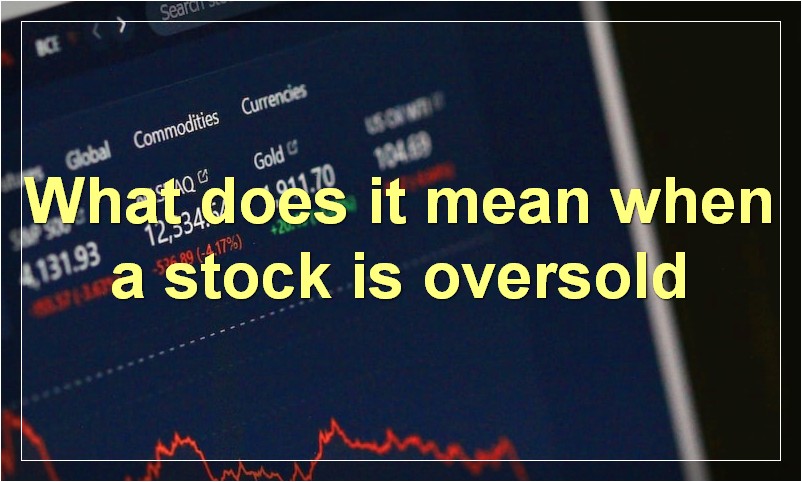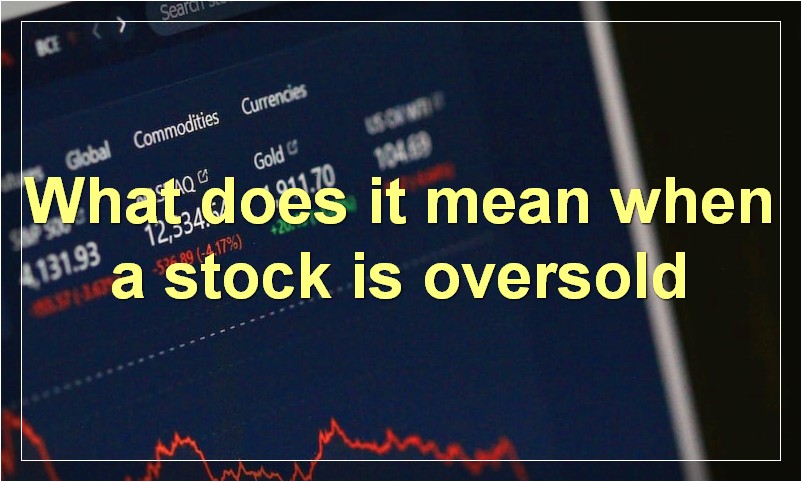The current market conditions have created a perfect storm for stocks to be oversold.
What is a stock oversold
A stock oversold is a situation where the demand for the stock is low and the prices are falling. In this situation, the stock is said to be “oversold.” Oversold stocks often present opportunities for investors because they may be undervalued.
What does it mean when a stock is oversold

When a stock is oversold, it means that it has been sold more than what is considered normal or healthy. This can happen for a variety of reasons, but usually happens when investors are feeling bearish about a particular stock or the market in general. Overselling can lead to a sharp decline in price, so it’s important to be aware of this when making investment decisions.
Why are stocks oversold
When investors believe that a stock is overvalued, they may start selling it off in order to avoid losses. This can cause a stock to become oversold, meaning that it is trading at a lower price than what investors believe it is worth. This can happen for a variety of reasons, such as if a company releases disappointing earnings results or if there is negative news about the company in the media. Oversold stocks may eventually rebound back to their original prices, making them attractive to bargain-hunting investors.
How do I know if a stock is oversold
When looking at whether a stock is oversold, the first thing to consider is the stock’s price relative to its recent performance. If the stock has fallen sharply in price but there hasn’t been a corresponding decrease in the company’s fundamentals, then the stock may be oversold. Another technical indicator to look at is the Relative Strength Index (RSI), which measures how overbought or oversold a stock is. A stock is considered oversold when the RSI is below 30.
Is it bad to buy an oversold stock
When a stock is oversold, it means that it has been sold off more than is warranted by the underlying fundamentals. This can happen for a variety of reasons, such as panic selling, insider selling, or simply because the market is overreacting to bad news. While there may be some bargains to be had when buying oversold stocks, there is also a greater risk of losses. Therefore, it is important to do your research before buying any oversold stock.
What happens when a stock becomes oversold

When a stock becomes oversold, it means that there has been a lot of selling pressure and the stock price has dropped significantly. This can be due to a number of reasons, such as a company’s earnings report being weaker than expected, or negative news coming out about the company. Oversold stocks are often seen as being undervalued by investors, and so they may start buying the stock, which can cause the price to rebound.
Should I sell my stock if it becomes oversold
If you’re thinking about selling your stock because it has become oversold, there are a few things you should consider first. If you believe the stock is still undervalued and has potential to increase in value, then you may want to hold onto it. However, if you’re concerned about the stock becoming further oversold and don’t believe it has much upside potential, then selling may be the best decision. Ultimately, it’s important to make a decision based on your personal financial goals and risk tolerance.
What is the difference between an overbought and oversold stock
When a stock is overbought, it means that the demand for the stock is higher than the supply. This can happen when a company is doing well and investors are buying up the stock because they believe the price will continue to go up. An oversold stock is the opposite – the supply is higher than the demand. This can happen when a company is struggling and investors are selling off the stock because they believe the price will continue to go down.
What are some indicators that a stock is oversold
When a stock is oversold, it means that it has been sold off more than is warranted by the underlying fundamentals. This can happen for a variety of reasons, including investor fear or panic, a change in analyst sentiment, or simply because the market is overreacting to bad news. Whatever the reason, an oversold stock presents an opportunity for savvy investors to buy low and potentially profit when the stock price rebounds.
There are a few technical indicators that can be used to identify oversold stocks. One is the Relative Strength Index (RSI), which measures how much recent gains or losses have affected a stock’s price. A reading below 30 indicates that a stock is oversold, while a reading above 70 indicates that it is overbought. Another popular indicator is the Stochastic Oscillator, which measures whether a stock is currently trading above or below its recent price range. A reading below 20 indicates that a stock is oversold, while a reading above 80 indicates that it is overbought.
Of course, no single indicator should be used in isolation when making investment decisions. However, if you see a stock that is showing signs of being oversold on multiple indicators, it may be worth taking a closer look.
Can a stock become oversold multiple times
While a stock can become oversold multiple times, it is important to remember that this does not necessarily mean that the stock is a good investment. Oversold stocks may be more volatile and risky, so it is important to do your research before investing.

